Key takeaways:
- Understanding the balance between technology and regulation is crucial for enhancing user experience in telecommunications.
- Well-defined telecom policies are essential for consumer protection, fostering competition, and ensuring equitable access to services.
- Stakeholder engagement and data-driven decisions significantly improve policy development and implementation.
- Flexibility and collaboration across sectors are vital for navigating challenges and adapting to the fast-paced technological landscape.
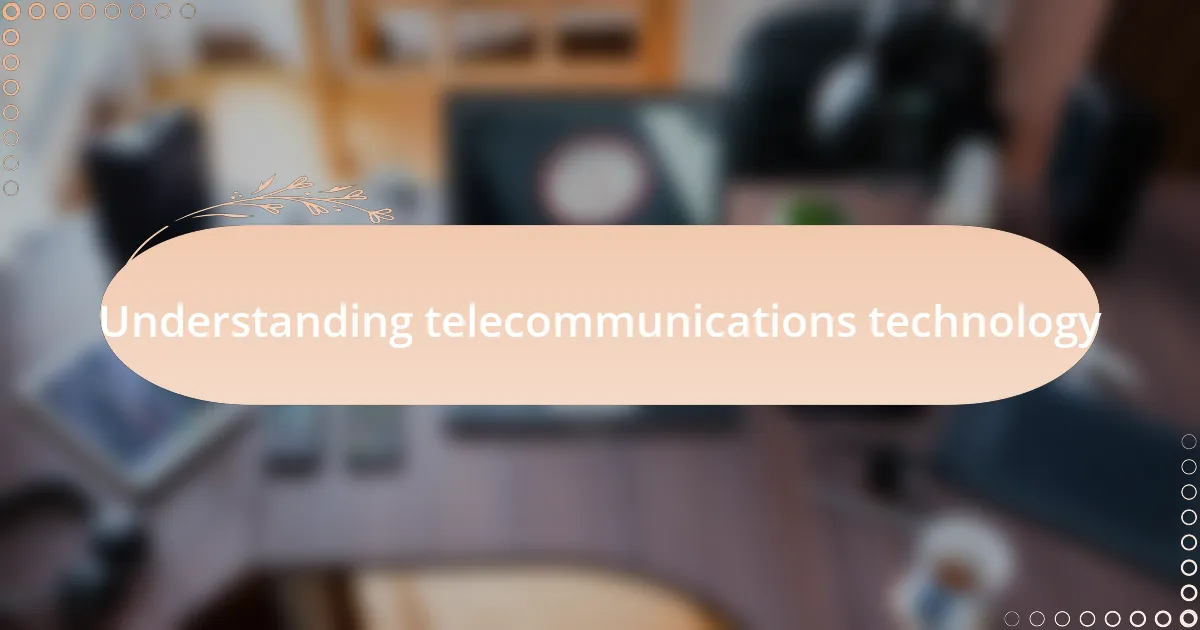
Understanding telecommunications technology
Understanding telecommunications technology requires a deep dive into how various components work together to facilitate communication. I remember the first time I grasped the elegance of signal processing—just a series of commands turning a voice into data packets. It made me realize how interconnected our world truly is; isn’t it fascinating how a simple phone call can traverse vast distances instantaneously?
As I navigated the complexities of policy development, I often pondered the role of infrastructure in shaping access to these technologies. The physical connections, like fiber optics, are the backbone of our digital communication. Reflecting on my experiences, it struck me that the more robust the infrastructure, the more opportunities arise for innovation and growth—so, how do we ensure that every corner of society has access to these advancements?
In my journey, I’ve seen firsthand how the convergence of technology and policy can either inhibit or enhance the user experience. For instance, understanding the balance between regulation and innovation opened my eyes to the intricate dance that defines the telecommunications landscape. Can we find that sweet spot, where regulation safeguards users while still allowing for the creative leaps that push technology forward?
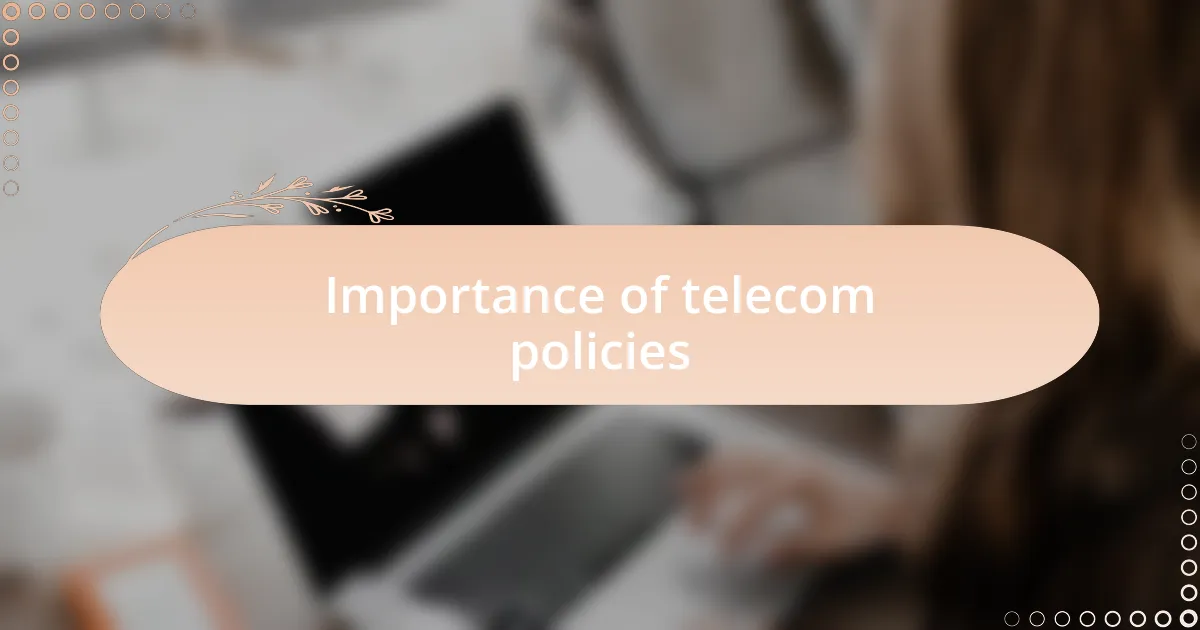
Importance of telecom policies
Telecom policies are crucial in establishing a framework that governs how services are delivered and accessed. I recall a time when a rash of network outages affected my area, and the lack of clear policies made it challenging for consumers to understand their rights and the service provider’s responsibilities. It dawned on me that without solid regulations, customers might be left in the dark during critical times.
I’ve often thought about how thoughtful telecom policies can nurture competition among service providers. When I worked on a local initiative advocating for policy reform, I saw how fair regulations led to an influx of new players in the market. This not only improved service quality but also drove down prices, benefiting everyone. Isn’t it amazing how policy can act as a catalyst for change in such a dynamic industry?
Moreover, I believe that comprehensive telecom policies play a vital role in protecting consumers and ensuring equitable access. During a seminar on digital equity, I learned how underserved communities can struggle without adequate policies advocating for their needs. It reminded me that, as someone who believes in accessibility, the right policies can illuminate pathways for marginalized groups to thrive in our increasingly digital world. How can we ignore their importance?
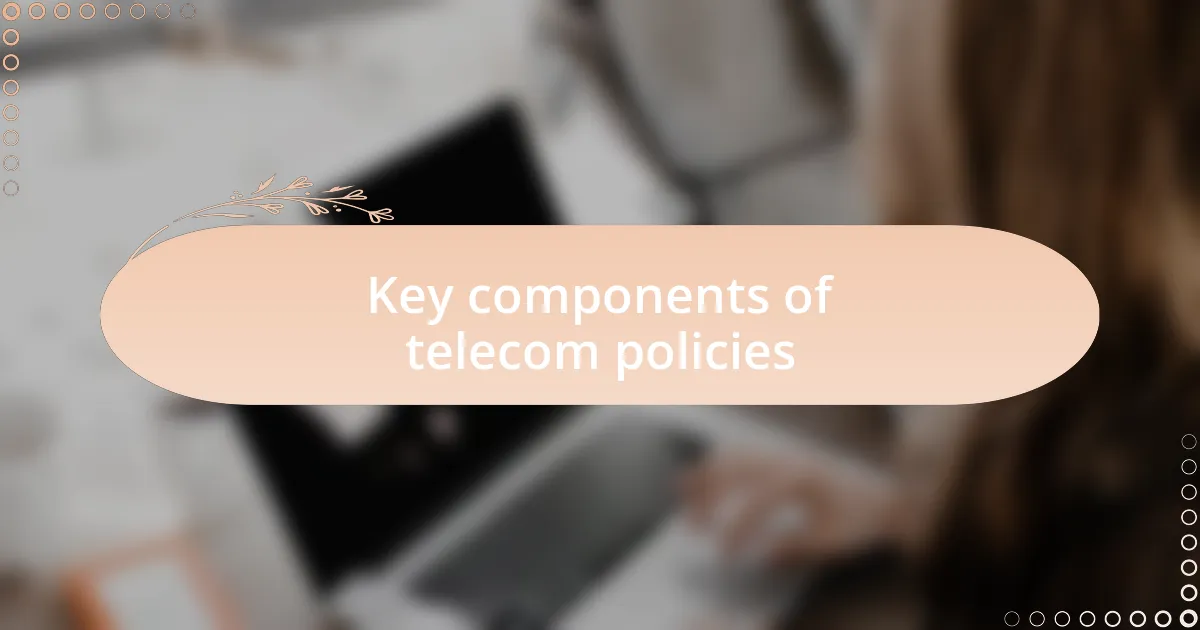
Key components of telecom policies
When I think about the key components of telecom policies, the regulatory framework immediately comes to mind. It establishes the rules of engagement for all stakeholders—service providers, consumers, and government entities. I remember sitting in a meeting where policymakers emphasized the need for clear guidelines to ensure that innovation could flourish without unnecessary bureaucratic hurdles. Isn’t it empowering to consider that policies can pave the way for new technologies?
Another vital component is the emphasis on consumer protection. I witnessed firsthand the challenges consumers face when their interests aren’t adequately safeguarded. For instance, during a regional outage, people felt frustrated and confused, as they didn’t know how to voice their grievances. This experience solidified my belief in policies that ensure transparency and accountability from providers. How reassuring it is to know that well-defined policies can help bridge the gap between consumer rights and corporate responsibilities.
Lastly, I can’t overlook the importance of technological advancement and how it’s integrated into policy-making. In my experience, policies need to evolve alongside rapid tech changes. I recall discussing the implications of 5G with industry experts and how our policies must adapt to accommodate emerging technologies. Shouldn’t we strive for policies that are both forward-thinking and reflective of the fast-paced nature of our digital world?

My role in developing policies
In my role as a policy developer, I’ve had the unique opportunity to collaborate with various stakeholders who contribute to the telecommunications landscape. I remember negotiating with industry representatives while drafting a new policy that aimed to balance innovation and regulation. It was fascinating to see how each party brought their own perspectives, especially when we focused on finding common ground. How rewarding is it to witness diverse opinions converging to foster progress?
An essential part of my job has involved conducting research to identify the needs of consumers and providers alike. I recall a project where I gathered data on consumer feedback regarding broadband access. The stories I heard from everyday users were eye-opening; there were families struggling to get online for remote learning. This connection between research and real-world impact reinforced my determination to develop policies that prioritize accessibility and equity. Isn’t it incredible to think that our policies can actually transform lives?
Moreover, I often find myself reflecting on the ethical implications of the policies we create. During a recent review session, I raised concerns about data privacy and security in the digital age, feeling a strong sense of responsibility to protect users. The discussions that followed highlighted the urgency of addressing these issues within our regulatory framework. How can we ensure that our policies not only advance technology but also uphold the values we cherish as a society?
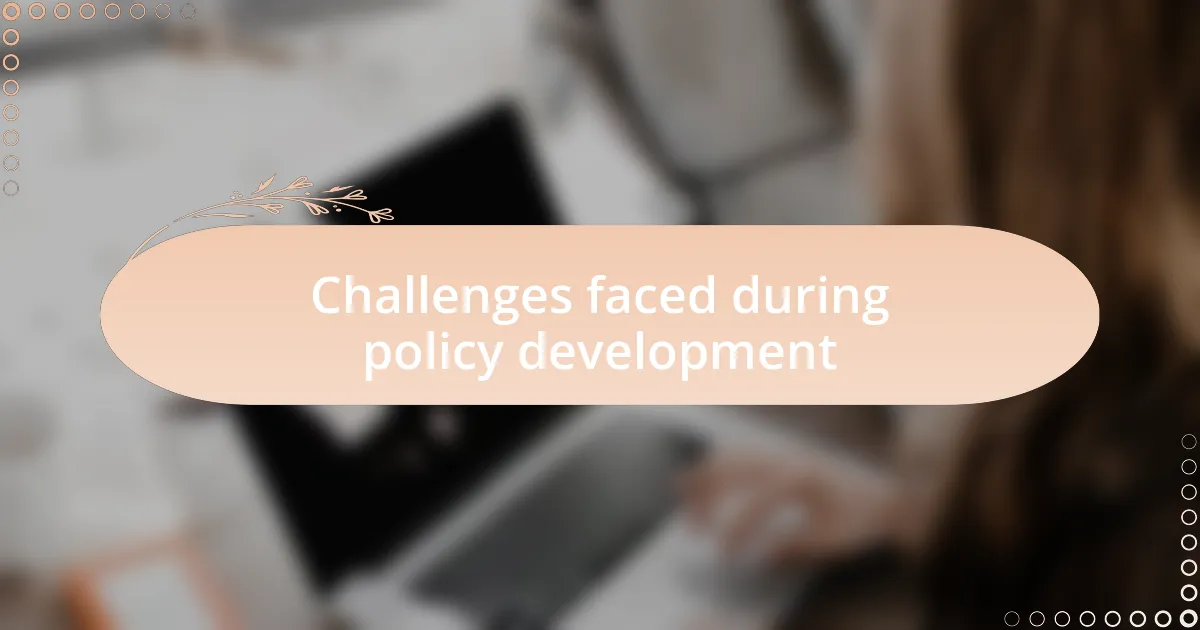
Challenges faced during policy development
Developing effective telecommunications policies is no small feat, and I’ve often encountered resistance from various stakeholders. I vividly recall a meeting where a key player in the industry pushed back against proposed regulations, arguing they stifled growth. This encounter underscored how balancing industry interests with consumer protection can be like walking a tightrope—one slight misstep can lead to a fallout that affects everyone involved. How do you negotiate when each party has a fiercely different vision?
Another challenge I faced was aligning the often diverse perspectives of regulatory bodies and technology providers. In one instance, while drafting a policy regarding 5G deployment, I found myself navigating a minefield of technical jargon and differing priorities. It was a real test of patience and communication skills, as participants struggled to understand each other. This experience taught me that clear communication is fundamental; without it, even the best ideas can get lost in translation. Have you ever tried to convey a complex idea to someone who sees things through a completely different lens?
Finally, the pace of technological advancement can leave policy development struggling to keep up, which I’ve experienced firsthand. Just last year, we were attempting to finalize a framework for internet of things (IoT) innovations, and daily, new technologies emerged that shifted the ground beneath us. This constant evolution means we must remain flexible and willing to adapt, which can be exhausting but also exhilarating. How do you maintain relevance in a field that changes daily?
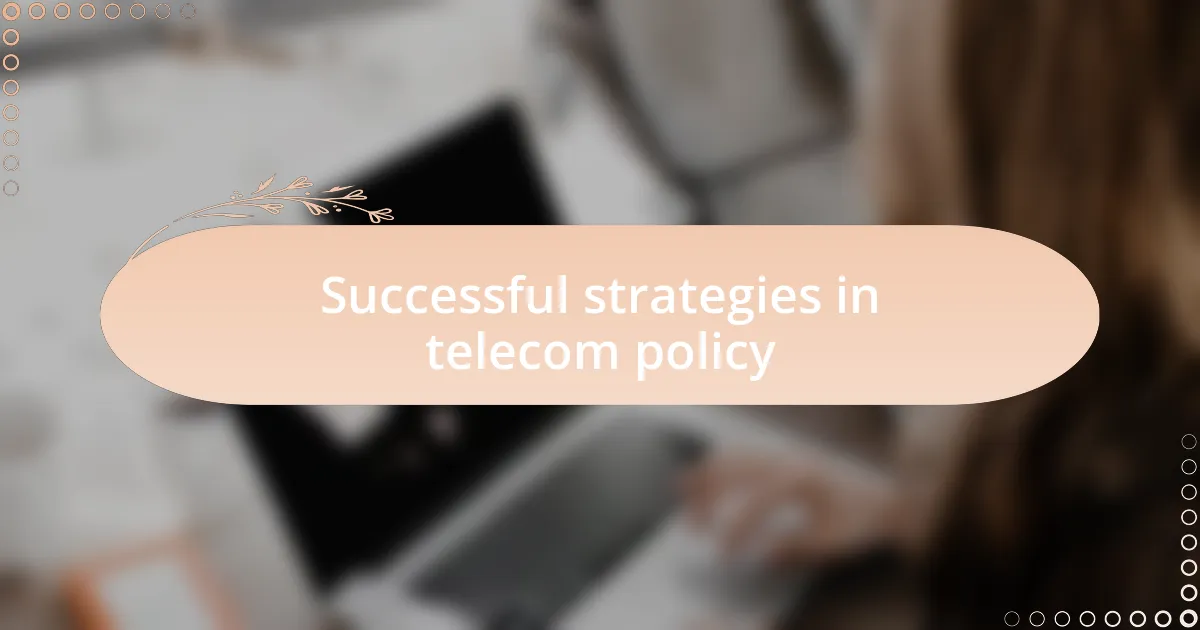
Successful strategies in telecom policy
When it comes to successful strategies in telecom policy, I’ve found that early stakeholder engagement often pays dividends. For instance, during a recent initiative to enhance rural broadband access, I organized a series of community forums that allowed local residents to voice their concerns and priorities. Witnessing the gratitude of those who felt heard made me realize that these dialogues not only shape better policies but also build trust, which is essential for effective implementation. Have you ever felt more invested in a project when you contributed to its direction?
Another effective strategy I’ve employed is leveraging data to support policy decisions. In one project, I analyzed usage patterns and service gaps, which illuminated the pressing need for better competition among service providers. Presenting this data not only made the case for regulatory changes clearer but also reframed it in terms that stakeholders could relate to, shifting the conversation from abstract policies to real-world impacts. Isn’t it amazing how data can transform narratives and drive action?
Lastly, I’ve learned the value of iterative policy development; it’s essential to view policy as a living document. I recall revisiting a cybersecurity framework after receiving feedback from industry experts and consumers alike, allowing us to refine our approach continuously. This adaptability not only fosters innovation but also encourages collaboration across sectors. How many times do we solve puzzles in our professional lives, only to realize they need a few more pieces as we move forward?

Lessons learned from my experience
One of the most significant lessons I’ve learned is that flexibility is paramount in telecom policy development. During my work on universal service policies, I initially thought we had covered all bases, but real-world implementation highlighted unforeseen challenges. This experience taught me the importance of remaining open to feedback and being willing to pivot when realities change. Have you ever found that your initial plans didn’t align with actual needs?
I’ve also discovered that collaboration across multiple sectors often yields the richest insights. In a project aimed at enhancing mobile network coverage, I partnered with local government and even some non-profits. The differing perspectives led to innovative solutions that I hadn’t considered before. It’s fascinating how diverse voices can harmonize to create a more robust policy framework, isn’t it?
Finally, I learned that communicating the ‘why’ behind policies can be just as crucial as the policies themselves. When I articulated the benefits of investment in infrastructure upgrades during a series of town hall meetings, I witnessed an incredible shift in community support. This connection clarified the rationale behind our initiatives and helped dispel skepticism, illustrating that transparency fosters understanding and enhances buy-in. Have you ever seen a change in perspective when someone truly understood the reasoning behind a decision?